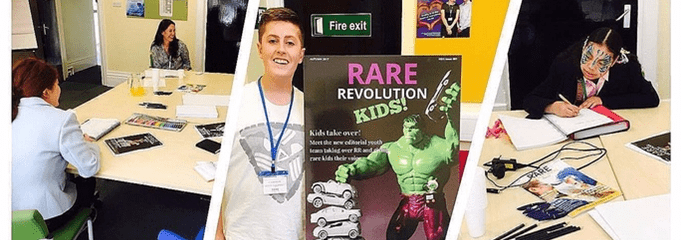
Rare Revolution Magazine is unique. Dedicated to giving rare disease sufferers and their families a voice and building them a community. It could easily be mistaken for a corporate enterprise, but is, in fact, a home-grown non-profit borne out of two small villages, one in Aberdeenshire, the other in Kent.
Created by two sisters, themselves members of a rare disease family, it is now one of the most vibrant and trusted portals for rare disease parties to come together in a safe, respectful and informed community.
With their efforts going from strength to strength, they were approached by the Wellcome Genome Campus in Cambridge to present their story to some of the leading minds in genomics when they addressed the October, ‘Bench to Boardroom’ lecture.
“It seems strange to hear ourselves referred to as entrepreneurs and to be here now talking to people who are experts in their fields. Maybe we have a bit of imposter syndrome? But therein lies the crux of what we’ll talk about today, it’s the experience and knowledge of the patients themselves and those closest to them which is so often not fully utilised.”
Nicola Miller and Rebecca Stewart established the Teddington Trust charity in 2012, in the wake of Nicola’s son’s diagnosis with Xeroderma Pigmentosum (XP) as a way of both communicating the condition to her son and raising awareness for others around them.
The condition is an autosomal recessive disorder, in which cells lack the ability to repair the damage caused by ultraviolet (UV) light. This can lead to sufferers developing multiple basal cell carcinomas and other dangerous skin malignancies that commonly affect the patient at a young age, forming metastatic malignant melanoma and squamous cell carcinoma – sadly, the most common causes of death amongst those afflicted.
“It’s difficult, with such personal stories about such rare conditions, to stop them becoming a ‘woe is me’ or sensationalised human interest story.”
Little Ted is the star of the Teddington Trust books and stories, which focus on educating those affected by the condition and normalising it for children struggling with it. Nicola’s Little Ted books have won a British Medical Association award for their accessible, well designed and clinically balanced patient relevant information.
The two sisters went on to launch their magazine, Rare Revolution, in the Autumn of 2016. “We were motivated to start the magazine because we had a hit a few hurdles in communicating through the charity,” said Rebecca Stewart. “It’s difficult, with such personal stories about such rare conditions, to stop them becoming a ‘woe is me’ or sensationalised human interest story.
“At first we imagined a glorified newsletter. We started with a Facebook page, a home-made website and set about the task of creating a multi-stakeholder environment.” Said Rebecca Stewart.“That community was one of the most unexpected aspects of this, but has now become one of the most powerful, creating a wonderful network for peer support. We received one video message from a reader about how reading our magazine had affected her and it was such a raw message. We knew then that we were on the right track.”
The sisters have a three-pronged vision of; being a safe space to share rare disease experiences, being a trusted place to find accessible, quality information and creating a place of belonging, a sense of a cross condition community.
The success they had seen, both in the magazine itself and the surrounding community, inspired them to start planning for the first edition of the magazine focused specifically on the experiences of children and young people. These groups, tragically, make up half of the world’s rare disease sufferers. They decided to call it the Rare Youth Project.
“They are really passionate and they want to be heard. They want to have ownership of their voices and of their conditions. Sadly, people often underestimate children’s views.”
“We started working on a version of the magazine that was not only focused on children with rare disease, but also planned, researched and written by children with rare diseases.” Said Rebecca.
All youth team applicants were appointed their roles in accordance with their interests and working together, this team have set the editorial direction,” said Nicola Miller. “They have chosen the interviews, and not soft topics, but big issues and big names. They’ve interviewed people like Scottish First Minister, Nicola Sturgeon. They wanted to do assignments and have meetings, not just to do everything over Skype.”
This version of the magazine will not only be online but will see a print run too as they want to give the children something tangible to be proud of and to enable them to put copies in children’s hospitals and schools thus bringing more people into their community fold. The publication date will be February 2018.
Rebecca Stewart added: “They are really passionate and they want to be heard. They want to have ownership of their voices and of their conditions. Sadly, people often underestimate children’s views.”
“We want to create a place where everyone can come together as an equal and where there is learning on all sides.”
The two sisters have no science or publishing backgrounds and with five children between them; run a charity, publish a magazine, write all the content, do all the graphics and layout, do all of the outreach and logistics themselves.
“We didn’t have a business plan when we started it, neither the charity nor the magazine,” stated Nicola Miller, “we just ploughed in. We do everything, what you see here (gesturing to herself and her sister) is it.”
“Moving forward, we have to work smarter. We don’t like to say no to good ideas but as just two peop
le we are at a stage where we cannot possibly take on any more. As a self-funded start-up we have little choice at the moment but hope to be able to secure funds to allow us to bring in some new team members in the not too distant future. As a not-for-profit, our roots lie in being a safe pair of hands that this rare community can trust, and we have a future vision for growth that includes the wider advocacy community benefitting too.”
“When our children were born we both decided to be stay at home mums. Stay at home mums do the most important job in the world but society doesn’t always recognise that. Said Rebecca. “Unfortunately society has a habit of pigeon holing people, whether you are a parent, patient, or medical professional, but we forget that these labels are not the sum of a person. In the rare disease community necessity has driven those affected to become experts in unlikely areas because, quite simply, their lives depend on it. We want to create a place where everyone can come together as an equal and where there is learning on all sides.”
You can show your support for those living with rare disease by subscribing for your free quarterly digital edition of the fantastic Rare Revolution magazine at https://www.rarerevolutionmagazine.com/.
If you would like to support the Rare Youth Project please visit https://www.rarerevolutionmagazine.com/rareyouthproject.html or contact Rebecca on advertising@rarerevolutionmagazine.com

.png?width=320&height=192&name=Untitled%20design%20(8).png)
.png?width=320&height=192&name=Since%202016%2c%20the%20number%20of%20women%20working%20in%20STEM%20fields%20in%20the%20UK%20has%20increased%20by%20216%2c552%2c%20taking%20the%20total%20number%20over%20the%201%20million%20mark%20for%20the%20first%20time.%20Women%20now%20make%20up%2024%25%20of%20the%20STEM%20workforce%20i%20(2).png)
-1.png?width=320&height=192&name=Deciphering%20Developmental%20Disorders%20(1)-1.png)